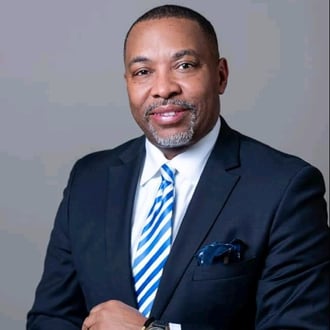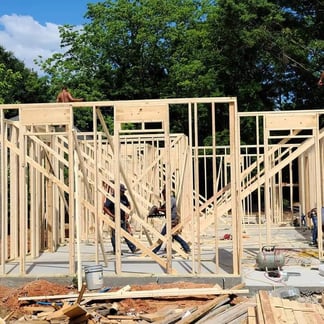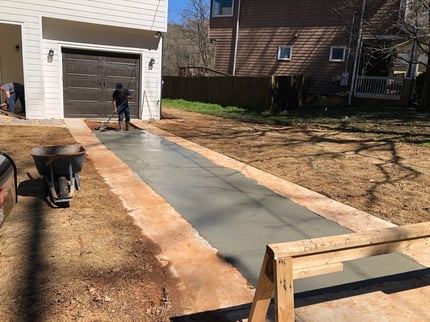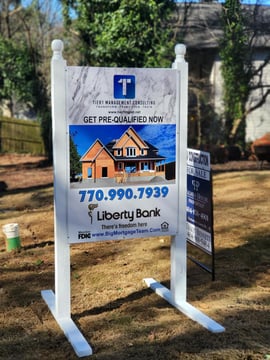We recently caught up with Jonathan Reid, an Atlanta-based real estate investor who's worked with Groundfloor on several projects. We chatted with Jon to learn about his journey into real estate and what his biggest piece of advice is for prospective flippers.
How did you get into homebuilding/the real estate industry?

My first introduction into the real estate world was while I was still in college. My uncle owned a renovation business, so I’d work with him doing various different jobs to make some extra money during the summers. They were fairly basic tasks – putting up wallpaper, painting, stuff like that – but it gave me my first taste of what the real estate industry was like.
After college, I went on to get an MBA in finance and worked for many years in corporate finance. Along the way, I began realizing just how powerful a tool real estate was for building wealth. By taking advantage of the equity and available lines of credit, you can essentially use your properties as a source of financing without having to go through an actual bank. I was excited about the possibilities real estate could offer, so I began reading and learning all I could about the industry.
Around that time, I met and befriended an experienced real estate professional who agreed to act as my mentor as I learned the ropes of flipping. We worked really well together and with his guidance I began completing my first flips in Atlanta. We eventually decided to go into business together, and in 1995 we created House 911, an organization that provided educational seminars and mentorship for folks interested in getting started in the real estate industry. This venture, combined with the success I was having in flipping houses, enabled me to eventually quit my corporate job and dedicate myself full-time to real estate.
Then in 2008, the crash hit, and people largely stopped buying and selling homes. A lot of developers (including us) ended up getting caught, and we lost money because we were only doing fix and flip projects and real estate wholesaling. It was definitely a hard lesson to learn, but it showed me that we needed to switch up our business model to include more rentals.
Since then, I’ve largely pivoted away from the fixing and flipping side of things as it’s become much more of a heavy lift. I’m now looking more towards new construction projects, and I’ve also begun mentoring my son as he embarks on his own real estate journey. My business partner and I are still running our educational program, now called HouseJerk, and we’ve been able to mentor many up-and-coming real estate entrepreneurs through our online webinars and forums. In fact, two students from this group, Seon and Shawna, have since gone on to establish their own successful real estate businesses. I love that I have the opportunity to pass on what I’ve learned to the next generation so they can begin building and creating wealth for themselves.
How many projects have you completed? How many are you currently working on?
I’ve completed about 50 projects - mostly rehabs - since I first got started. I recently finished two new construction projects with Groundfloor, and I’m in the process of closing on two other properties using Groundfloor as well.


What are some of the key things you take into consideration when you are completing a real estate project?
In general, I tend to follow three steps when it comes to my projects. Step one is finding a good deal – I look at available listings in the locations I’m interested in and see if there is anything that looks promising. Step two is evaluating that deal – I reach out to contractors and real estate agents to make sure the numbers line up and the renovation/construction plans are viable and realistic. The final step is funding the deal – I talk to lenders and figure out timelines so I can ensure I have the financing I need when I need it.
These days, the number one thing I’m looking at is where I’m sourcing my materials and labor. As we all know, the cost of everything has shot up with inflation, so many cost forecasts have been really off base. These cost pressures, combined with the continuing supply chain issues, are really complicating project timelines and budget predictions. In this current environment, it’s become even more important to stay on top of where your materials are coming from, when they are expected to arrive, and how you might handle any unexpected delays or issues.


Has the current economic environment affected your business? If so, how?
Yes and no. Since I typically use hard money loans to finance my projects, I tend not to worry too much about rising interest rates on the front end – since the loans are short-term, the interest rate just kind of is what it is. However, interest rates do affect consumers’ buying power, so rate hikes are something that can potentially affect whether or not I can sell the property at the end.
As interest rates keep rising, I think we’re going to see a corresponding shift in the housing market – already there have been reports of certain markets starting to cool off. I’m predicting a major market correction in the coming months, so I’m working hard to get my deals done and my projects completed now. I’ve also begun turning back towards more buy-and-holds and rental properties, as I anticipate those strategies will help hedge against any downturns that may be coming.
How did you find Groundfloor?
I was looking for a hard money lender to work with and came across Groundfloor. I reached out to Jeff [Seal, Director of Originations] one day to talk through new construction projects and what that process would look like with Groundfloor. Jeff was so helpful and stayed on the phone brainstorming different scenarios with me, even offering to refer me to other lenders if my project didn’t fit with Groundfloor’s offerings. Though at the time I didn’t have a specific deal in mind, that transparency, honesty, and willingness to help really stuck with me. Once other opportunities came through, I knew I wanted to reach out to Groundfloor first.
What has been your experience working with Groundfloor?
All in all, it’s been great! I love how clear the Groundfloor process is, and while there are the occasional bottlenecks, overall I have been very satisfied with Groundfloor’s communication and support. I am always referring other real estate investors and homebuilders I come across to Groundfloor because of that.
What are some of your goals for your business in the next few years?
Right now I typically complete about three projects a year, and I plan to stay right around that number as it works well for my finances and preferred work-life balance. Apart from that, I’m interested in more passive wealth-building strategies, such as acquiring properties to rent out or even taking on small apartment complexes. As I mentioned before, I think having a steady stream of passive income will help protect against any coming housing decline.
I’m also very interested in developing more affordable housing options such as tiny home communities. I’m all about helping others start to build wealth, and these kinds of properties offer a more reasonable entry into homeownership for many people. I’ve been learning a lot from my network about these kinds of projects and I’m eager to dive in.
If you could give a newer flipper one piece of advice, what would it be?
 Number one: Start small, and start the right way. Put your signs out, work your connections, get your phone ringing. Get acquainted with what makes a good deal and start looking at the numbers – if the numbers don’t make sense, the project won’t make sense. It’s definitely a learning curve at first, but once you understand the math, it’s the best way you’ll be able to start building wealth. One house at a time!
Number one: Start small, and start the right way. Put your signs out, work your connections, get your phone ringing. Get acquainted with what makes a good deal and start looking at the numbers – if the numbers don’t make sense, the project won’t make sense. It’s definitely a learning curve at first, but once you understand the math, it’s the best way you’ll be able to start building wealth. One house at a time!
Number two: Network! Despite what it might look like on television or social media, real estate is not easy or a “get rich quick” scheme. It’s all about finding good people and building relationships. Be sure you trust your contractors, your surveyors, and everyone in between. Time is money – make sure people aren’t wasting yours.
Last but not least: Make sure you get accurate budget forecasts on your statement of work, and make sure you’re on top of on all your legal requirements and permitting. There are a ton of hidden costs that go into real estate projects – insurance costs, attorneys, closing fees, permitting fees, etc. – so it’s crucial you account for all of them when running your numbers.
Additionally, don’t forget to get a land survey to make sure you can actually build on whatever land you get! I’ve seen situations where builders have their projects all planned out only to discover the property sits too close to an embankment or property line or something. I promise, you don’t want to be the person that has to start all over again from scratch because you skipped that step!
Thanks Jon! It's a pleasure to work with you!


